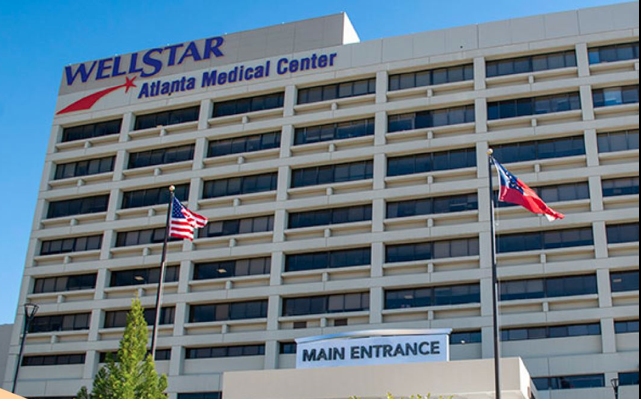Abrams: Closed hospitals caused by lack of Medicaid expansion
Published 4:45 pm Tuesday, September 20, 2022

- Wellstar announced that Atlanta Medical Center will be closing Nov. 1Photo from Wellstar Atlanta Medical Center's Facebook page
ATLANTA — Democrat gubernatorial candidate Stacey Abrams blamed Gov. Brian Kemp and Republican leadership’s refusal to expand Medicaid for the closure of hospitals around the state, most recently the impending closure of Atlanta Medical Center, the only other Level 1 trauma center in the metro area.
In the last 10 years, 14 hospitals in the state have closed, most of them, however, in rural areas of the state.
Trending
“This is a solvable problem. and yet, it seems to be that the governor is unwilling to address the whole of the issue,” Abrams said, touting the need for Medicaid expansion. “Instead of addressing and tackling the closures of these hospitals, we know that once again, there will be a small step forward that does not take us anywhere close to the solutions we need. We already have a strained medical system that will suffer even greater burdens.”
In preparation of the Nov. 1 AMC closing, Kemp announced plans Sept. 15 to use federal American Rescue Plan Act funds to shift resources 1.5 miles away to Grady Memorial Hospital, which will soon be the only Level 1 trauma center in the Metro Atlanta area.
The state, he said, is allotting $130 million in ARP finds to permanently increase Grady Memorial Hospital’s capacity by nearly 200 beds. AMC was a 460-bed facility that served more than 50,000 patients in 2020 who sought indigent care.
“Grady is already in the process of adding more than 40 beds that will be available by Nov. 1, so these additional 200 will come online in a rolling fashion as Grady moves into its new surgical tower next year,” Kemp said. “This is more than enough capacity to cover the average patient census that AMC support.”
Grady Health System is expected to receive $130 million through the Georgia Aid Program, he added.
Kemp said the state will reallocate a temporary medical unit used during the early COVID-19 surge to Grady Hospital, which will add 24 patient rooms and 12,000 square feet to Grady’s footprint.
Trending
“These supports we’re providing Grady are a recognition of its importance to the region and their prominent position in the long-term health care provider makeup of our state,” Kemp said. “In other words, these are not Band-Aid solutions. They are meaningful, carefully thought out and implemented measures designed to ensure this cornerstone of Atlanta’s health care network is on solid footing for many years.”
But some disagree. Dr. Mark Spencer, a care resident at Grady Health System, said the hospital is already overburdened and Kemp’s announced allocations will likely not provide permanent reprieve.
“Even 100 extra beds at Grady is not going to solve the problem of already overburdened hospital and a 400-plus bed hospital closing,” Spencer said during Abrams’ Sept. 15 press conference. “Just to contextualize, we have right now wait times in the emergency room often over 12 hours long to be seen and that’s going to get much worse. We have patients that get admitted to the hospital that have to sit in the emergency room for two, three, four days on end because we don’t have hospital beds available. Even 100 extra beds is not going to solve that problem.”
He said Medicaid expansion could be a long-term solution to the health care crisis Georgia faces. Georgia is one of 12 states that have not expanded Medicaid.
“Without health insurance, it’s hard to get access to your appointment, it’s hard to pay for any of your medications for your chronic disease,” Spencer said.
“Ultimately, it’s self defeating because what happens is these patients get sick, they show up to the emergency departments that are already overburdened with much more advanced disease that was preventable — whether it’s colon cancer or end stage, diabetic foot ulcer — and this ends up costing them a lot of suffering … a lot of money and time that could have been prevented if we simply had health insurance and access upfront.”
Under a full Medicaid expansion, 90% of costs would be funded federally, and more than 500,000 Georgians could gain insurance, according to estimates. The state would bear 10% of the costs.
In a statement, Wellstar — which has operated AMC since 2016 — attributed inflation, decreasing revenue and more than $100 million in losses in 12 months to the decision to close the location. Candice L. Saunders, Wellstar chief executive officer, stated the company has also invested more than $350 million in capital improvements and to support sustained operating losses at AMC since 2016.
“The pandemic and the intense financial headwinds straining health care organizations right now have only made matters worse at AMC,” the statement read.
Abrams implied if Medicaid expansion would have been in place years ago, it may have prevented the hospital’s (and others’) financial troubles.
“Medicaid expansion is not simply about a one-time infusion of capital. It is about how many patients get shifted from indigent charity care into preventative regular care,” Abrams said. “It’s a primary care.
But what we know empirically, in every state that has expanded Medicaid, there’s an initial spike and then there is a wholesale reduction in the number of indigent care and charity patients who are using those services. and so, until WellStar demonstrates, in a very clear, empirical way, that eight years of infusion of cash they could have shifted some of their charity care off of their books and into other provision of care, I actually do not believe that they are being wholly honest about what Medicaid expansion could have done.”
“When we think about what Medicaid expansion means, it means that our patients not only are able to come when they have an emergency, it means that they’re able to get their regular care, they’re getting there when they are pregnant and from the very beginning,” added Dr. Monique Smith, an emergency physician at Grady Memorial Health. “They’re coming in to have their blood pressure checked, depending if they’re high blood pressure, they’re getting transportation to appointments, and if necessary, they’re actually programs that allow them to come to houses. There’s so much that’s happening in the larger world of Medicaid innovation that allows people to be careful to not to be sick.”
According to the Georgia Budget & Policy Institute, closing the coverage gap for Medicaid could cost the state $136 million a year on average. The estimate, however, was based on 2012 and a 2013 economic study.
Republicans have argued that small expansions to Medicaid as an alternative to a full expansion is a less costly option to the state.
In January, Kemp filed a lawsuit against CMS and related parties under the Biden Administration for rescinding the state’s plan for a slight Medicaid expansion that was approved under former President Donald Trump in 2019.
The plan would have added approximately 50,000 uninsured Georgians to a Medicaid plan but they would have to have a minimum of 80 hours per month of work, job training, education, volunteering or similar activities. People with incomes of up to 100% of the federal poverty level ($21,960 for a family of three) would qualify.
“Simply put, the Biden administration is obstructing our ability to implement innovative health care solutions for more than 50,000 hardworking Georgia families rather than rely on a one-size-fits-none broken system,” Kemp said.
“They have attempted an unlawful regulatory bait and switch, and it is clear that their decision is not being driven by policy – rather politics – as they attempt to force their top-down agenda on the American people.”
CMS said the state’s plan for the qualifying hours requirement component didn’t meet the objectives of Medicaid, which is to provide coverage for low-income or poorer Americans.





